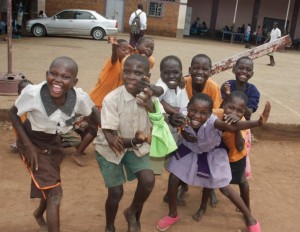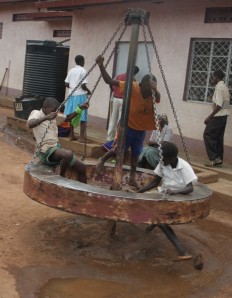Over 1,000 Acholi, Kjong street kids face deportation
By Julius Odeke
20th June 2011:
MBALE- They ignorantly cheer at the camera while playing various games at the Child Rehabilitation Outreach Centre in Mbale. Little do they know, however, that the authorities are in a meeting busy discussing ways of sending them back to their villages.
There are over one thousand street kids in Mbale who could be returned to their homes. In an interview with this reporter, the local police Superintendent Mr. Jacob Opolot said members of the public had filed several complaints against the street children.
“…Many people have come complaining to police about the bad conduct of these street kids. They are littered all over town begging as a means of survival. Now the public has suggested to us as police to order for their deportation. We in police force are merely servants. We don’t act as bosses”, said the police chief.
Most of the street kids are poor children. While some came from the semi-arid region of Karamoja [where violence and cattle rustling is rife], others came from the Acholi sub-region that was devastated by the Lord’s Resistance Army [LRA] rebels war against President Museveni’s government that lasted over 21 years.
One of the businessmen who talked to this reporter on condition that he is not named citing security reasons said, “…we cannot move in this
town after 9:00pm local time due to heinous acts of these street kids. They throw faeces and other dirty stuff on passersby. This has crippled our businesses and yet business booms at night when revellers come to enjoy themselves in night clubs”.
NGOs oppose deportation of street kids
Mr. Moses Bwayo, the Manager of Child Restoration Outreach [CRO], a local NGO operating in Mbale says begging has become a way of life for street children. “…Most of these street kids have gotten used to begging. People working in restaurants also give them food leftovers that they refer to as makombo. This has given our rehabilitation social workers a hard time because the kids don’t want to be rehabilitated”, Bwayo said.
Bwayo is also opposed to moves to relocate the street kids to their home districts. “…I am optimistic that through proper dialogue with the district authorities, we shall manage to have these children given decent treatment but not to subject them to relocation because most of them are traumatized since their parents died during the insurgency in Karamoja and Acholi”, said Bwayo.
Others, Mr. Bwayo said, were forced into Mbale town by natural disasters like the mudslides that struck Namesti village in Bududa district. Mr. Bwayo’s Child Restoration Outreach is currently looking after 780 street kids who have been given the opportunity to go to schools around Mbale.
“…The transformation in the lives of these young people has been remarkable. From the life of unimaginable poverty, some of them are now looking to join professions like medicine, teaching, accountancy, and some even want to be police officers. This is very important for their future”, Bwayo said.
Mr. Bwayo also said the high food prices have made their work very difficult because the street kids need to be sufficiently fed. “…Some of these street kids need to eat enough food to feel happy. If they are given little food that is when they are tempted to go back to the streets”, Bwayo said.
Police Superintendent Opolot also said they are keeping a close eye on developments. “…As police, we are keeping a keen eye on them through our foot patrols. When we round them up, we take them to our police community liaison officers to sensitise them about the importance of living a decent life. Thereafter, we forward them to CRO”, Opolot said. END. Please login to www.ugandacorrespondent.com every Monday to read our top stories and anytime mid-week for our news updates.
![]()



